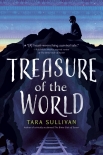Treasure of the World by Tara Sullivan (free ebook reader txt) 📕

Read free book «Treasure of the World by Tara Sullivan (free ebook reader txt) 📕» - read online or download for free at americanlibrarybooks.com
- Author: Tara Sullivan
Read book online «Treasure of the World by Tara Sullivan (free ebook reader txt) 📕». Author - Tara Sullivan
Why? was all that Mami had asked. It was the same question she had put to Daniel when, after the four months it took his cracked ribs to heal, he asked whether he could stay in the lowlands and live with César’s cousin for good. With so much more oxygen in the air, he was able to help out around the farm even with his asthma. By the time he visited for Christmas, he was so used to having good air to breathe that he gasped like a tourist when he got off the bus from Sucre. We all teased him that he’d gone soft, but he just grinned and showed off his new farmer’s muscles and we had left it at that. César’s cousin was thrilled to keep him, and Daniel has built himself a good life in that green valley.
For me, though, the question Why? had echoed deeply. Which is why I didn’t tell Mami that I was just happy to get a teaching job after all my training. I didn’t tell her any of the light, easy answers I handed to my school friends and city acquaintances like so much popcorn at a parade. Instead, I told her the truth.
Because, I said, somewhere up there is another little boy who’s thirsty for the sky, facing a lifetime in the dark. And somewhere up there is another little girl who has no idea how to dig out from under the weight of an unwanted future. They need to know that there are other paths. They need to know that the mountain is only a mountain, and the metal inside it is only metal, but that they are the treasure of the world.
And Mami had folded me into a hug and hadn’t asked me anything more about it.
I smooth my hands over my knees to wipe the sweat off my palms. I look out the windshield and over the city around me to the ugly mountain hulking on the horizon. This is for you, César, I think, for folding me into your family. And this is for you, Abuelita, for showing me the right currency to use to value my life. But most of all, this is for me.
He’s still sitting there, patiently waiting for my answer.
“I’m ready.” I cover the butterflies in my stomach with a laugh. “Are you sure this rust bucket will get us there?”
“Well,” he says, wrestling the heap into gear and setting off up the streets of San Cristobal, aiming for the peak of the mountain, “if it breaks down, you’ll be extra glad your best friend is a mechanic, won’t you?”
“Shut up, Victor,” I say. But I smile when I say it.
AUTHOR’S NOTE
I am rich Potosí
I am the treasure of the world
I am the king of all mountains
And the envy of all kings
—First coat of arms of the city of Potosí, 1547
My husband died a year ago. It has been very hard. It has also been a year since anyone has hit me. I have eleven children. May God grant that they not suffer as I have.
—Doña Serafina Sandoval Condor, 2016
My last book, The Bitter Side of Sweet, looked at the question of child slavery in modern-day chocolate production. There is near-unanimous agreement that forcing children to work, unpaid and unfree, is wrong. However, the fact of the matter is that in most of the world, kids work. After completing The Bitter Side of Sweet, I felt challenged to look beyond child slavery to the more nuanced issue of child labor. And few places are more nuanced to consider this question than Bolivia.
The International Labor Organization (ILO) is a branch of the United Nations. It defines child labor as “work that is mentally, physically, socially, or morally dangerous and harmful to children; and interferes with their schooling by: depriving them of the opportunity to attend school; obliging them to leave school prematurely; or requiring them to attempt to combine school attendance with excessively long and heavy work.” As of this writing, the ILO estimates that, worldwide, 218 million children age five to seventeen work, with 152 million being victims of child labor. Almost half are between the ages of five and eleven, and 73 million of them work in hazardous conditions. That’s a lot of kids!
Bolivia has a very high poverty rate. Many families cannot get by without the money their children bring in. More than three-quarters of a million children under the age of seventeen work in Bolivia. Up until 2014, the minimum age for a child to work was fourteen—the same as the United States, where that is the age restriction for “nonagricultural” jobs. In the U.S., there are also restrictions on how many hours a person under the age of sixteen can work and a prohibition against those under eighteen working in “hazardous occupations.” Bolivia, however, made headlines in 2014 by lowering the minimum age a child can work. Since then, children in Bolivia can work with their families from the age of ten, and for other people from the age of twelve.
Groups like Human Rights Watch and the United Nations immediately opposed this law. They saw it as opening up more opportunities to exploit impoverished children and keep them out of school. This is certainly a danger: when something becomes legal, more people do it. But what makes the 2014 law interesting is not who was speaking out against the law change, but who was asking for it.
UNATSBO (Unión de Niños y





Comments (0)